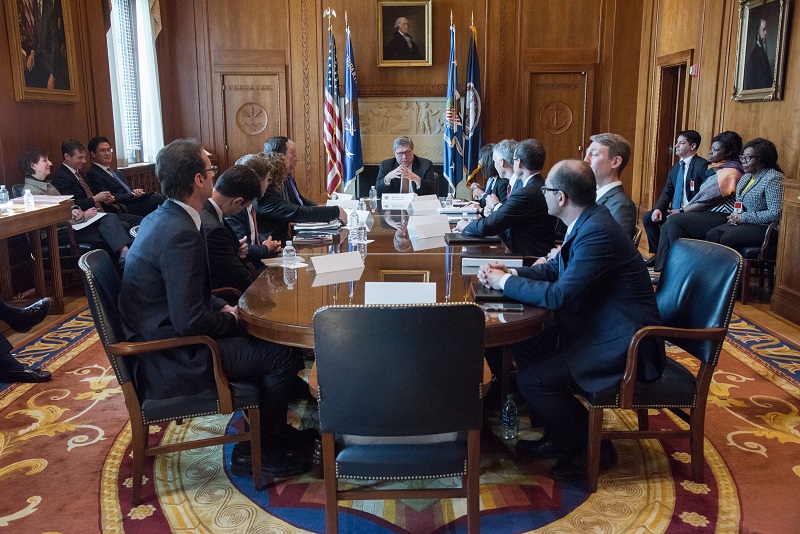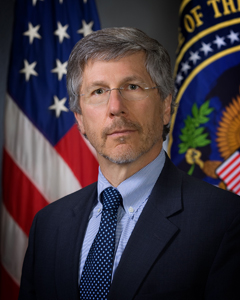Bill Barr’s Actions on the Mueller Report: A Response to Jack Goldsmith
Jack Goldsmith’s defense of Attorney General Barr’s handling of the Mueller report is typically thoughtful but ultimately unpersuasive. While certain aspects of Barr’s behavior could be defensible if they stood alone, taken as a whole his course of conduct—what he said, how he said it and what he didn’t say—shows that Barr is not merely “defen[ding] the presidency” institutionally, as Goldsmith argues, but defending this particular president politically.

Published by The Lawfare Institute
in Cooperation With

Jack Goldsmith’s defense of Attorney General Barr’s handling of the Mueller report is typically thoughtful but ultimately unpersuasive. While certain aspects of Barr’s behavior could be defensible if they stood alone, taken as a whole his course of conduct—what he said, how he said it and what he didn’t say—shows that Barr is not merely “defen[ding] the presidency” institutionally, as Goldsmith argues, but defending this particular president politically. I want to highlight a few points that undercut the argument that Barr has been acting in good faith.
Let’s start with what Goldsmith’s article largely fails to discuss: Barr’s April 18 press conference. In this press conference, Barr discussed Special Counsel Robert Mueller’s findings selectively and sometimes misleadingly—but always in a way that aligned with President Trump’s position. To give a few examples:
- Barr announced that Mueller found “substantial evidence to show that the President was frustrated and angered” by an investigation that was “undermining his presidency,” suggesting that “this evidence of non-corrupt motives weighs heavily against any allegation that the President had a corrupt intent to obstruct the investigation.” In fact, Mueller actually said that while “[s]ome evidence indicates that the President believed that the erroneous perception he was under investigation harmed his ability to manage domestic and foreign affairs ... [o]ther evidence ... indicates that the President wanted to protect himself from an investigation into his campaign.” In other words, Barr gave only half the picture.
- Barr said that “the President took no act that in fact deprived the Special Counsel of the documents and witnesses necessary to complete his investigation.” As Goldsmith concedes, Barr ignored the president’s refusal to be interviewed as well as Mueller’s conclusion that Trump’s former campaign manager Paul Manafort lied to the government after statements by the president that “had the potential to influence Manafort’s decision whether to cooperate with the government.”
- When asked whether the Justice Department’s policy against indicting a sitting president “had anything to do with” Mueller’s refusal to reach a decision on obstruction of justice, Barr responded that Mueller “made it very clear that ... [h]e was not saying that but for the [Office of Legal Counsel] OLC opinion, he would have found a crime.” Barr’s statement may be literally true, but given that Mueller’s actions derived entirely from his view that the OLC opinion precluded prosecution, it was misleading.
- Finally, Barr emphasized both in his letter and at his press conference that Mueller did not find a basis to charge Americans with conspiring with the Russians to affect our election. But he passed over Mueller’s cautions that “[a] statement that the investigation did not establish particular facts does not mean there was no evidence of those facts,” and that because of lack of access to certain witnesses and documents, Mueller “cannot rule out the possibility that the unavailable information would shed additional light on (or cast in a new light) the events described in the report.” Instead, Barr overstated Mueller’s findings, saying that “there was in fact no collusion” and that “we now know that the Russian operatives who perpetrated these schemes did not have the cooperation of President Trump or the Trump campaign.”
But even apart from Barr’s distortions of Mueller’s findings, the critical question is why Barr felt it was necessary to have a press conference to summarize Mueller’s report at all. In his March 24 letter, Barr said that it would not be “in the public’s interest” for him to “summarize the full report” because “[e]veryone will soon be able to read it on their own.” If it was not in the public interest to summarize the report three and a half weeks before its release, what—other than a desire to “spin” the contents of the damaging report in the president’s favor—made it in the public interest to do so 90 minutes before its release? Yes, the report itself was to be released shortly, but Barr surely knew that his statements would both shape initial perceptions of the report and be seized upon by the president in his defense—as they were.
Second, Goldsmith seems to agree with Barr’s criticism of Mueller for failing to make a determination as to whether or not the president obstructed justice. According to Goldsmith, a prosecutor’s job is to decide “whether or not there is a crime.”
Yet a prosecutor’s job is not to decide in the abstract whether or not a crime was committed, but to decide whether or not to bring criminal charges. That includes not just a determination of whether a crime was committed but also an assessment of whether prosecution would be in the public interest and consistent with Department of Justice policy.
As many others have noted, it is a fair reading of Mueller’s report that he felt that the evidence warranted indicting the president for obstruction of justice. Justice Department policy prevented Mueller from doing so. However, that policy applies only when the president holds office. At a minimum, President Trump would become subject to indictment if he is defeated in 2020—but that indictment would come from someone other than Mueller.
It is not clear what Barr and Goldsmith believe Mueller should have done given these circumstances. Mueller would undoubtedly have been criticized if he reported that he thought the president had committed a crime but did not indict him. Nor, given his apparent view of the facts, could Mueller exonerate the president. In testimony before the Senate Committee on the Judiciary, Barr suggested that Mueller should have shut down his investigation if he felt he could not indict the president. But if this rule were applied consistently, it would have precluded Mueller from finding that the evidence did not support charges of conspiracy—unless Barr believes that investigations should be shut down only if they tend to establish the president’s guilt.
The approach Mueller chose was a responsible one. He memorialized the results of his extensive investigation in what Barr repeatedly emphasizes was a confidential memorandum to him, so that a prosecution decision could be made when it became possible to do so. Indeed, that is exactly how Mueller characterized what he did: “[W]e conducted a thorough factual investigation in order to preserve the evidence when memories were fresh and documentary materials were available.” Media reports, not Mueller himself, have made the claim that Mueller’s office was, in Goldsmith’s words, “making an impeachment referral.”
Third, Goldsmith is too charitable in his assessment of Barr’s statement that the attorney general believes there was “spying” on the Trump campaign. To begin with, Barr’s suggestion that this was just an “offhand” remark is belied by the video of his testimony, which shows that he paused and thought before answering the question.
But more importantly, the effort to equate the term “spying” with “court-authorized surveillance” ignores both the current political context and the connotation of the term “spying.” The average citizen surely understands the phrase “spying on political campaigns” to mean Watergate-style dirty tricks: a surreptitious effort to learn what an opponent’s strategy is. And no one—not even the president’s most dedicated defenders—has found any evidence that that occurred here. Rather than being an effort to pry into political activities, the FBI’s activities were a counterintelligence investigation directed at identifying the scope of Russian activities and whether any Americans were working with them to undermine our election process. As with Barr’s use of the term “collusion,” his language seems calculated to lend political support to the president.
A final problem with Barr’s approach to the Mueller report is the things he hasn’t said. He could have taken the opportunity presented by Mueller’s devastating findings about Russian interference with our election to defend his own agency and its personnel—to note the indisputable fact that the FBI would have been derelict in its duty if it failed to investigate that interference and the credible information suggesting that Americans might be working with the Russian government or its agents. He did not. He could have disassociated himself from the president’s stated view that an attorney general’s job is to protect the president and reiterated that the Department of Justice’s independence from political pressure is critical to its acceptance by the public. He did not. His consistent choice instead to provide political cover to the president is disappointing.



.jpg?sfvrsn=676ddf0d_7)

